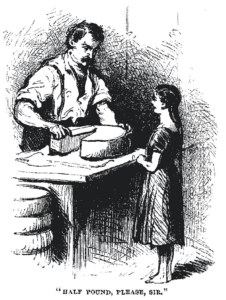People in Chicago will tell you that there is a happy land not far away. Sitting on the ash heap of their own miseries, they mournfully explain that just over the Wisconsin border everything is different. There public officials do not steal and banks do not fail; there criminals are not only arrested but mercilessly and swiftly convicted; there, believe it or not, an afterglow of prosperity still lingers. It sounds too good to be true.
If you cross the state line and inspect this earthly paradise, you may begin to think it isn’t true. As I went around the state, people told me familiar stories of idle factories and farm foreclosures, of mounting numbers of unemployed and relief funds reduced to the vanishing point.
An old proverb has it that cheese, peas, and Germans made Wisconsin prosperous. The great forests have been largely swept away by the rapacious lumbermen of the past, but there is still some lumber business, and the paper mills that were built when the raw material was close at hand are mostly still going. Two or three big automobile factories are getting along, but Wisconsin industry is largely small-scale. The Progressives claim credit for its comparative stability; their opponents claim that current policies will drive all industry, large and small, out of the state. Wisconsin unemployment may not look like much of a problem from Chicago, but it looks pretty tough in Wisconsin.
There are other states, both urban and rural, where a public official can be caught in all kinds of skullduggery and still be reelected by a record majority. Apparently not in Wisconsin; politicians have to be good, whether they want to or not. It was not always so. In the old days, when politics all over the country was more flagrantly corrupt than it is today, Wisconsin was just as flagrant as anybody. If it is different now, that is because the people have been taught to take an interest in their government—a continuing interest, not merely at election time. Everybody in the state is continually excited over the need to save the commonwealth from a gang of scoundrels, yet Wisconsin goes on being governed pretty honestly whichever side wins.
 However, one must take note of the remarks of the most articulate of recent Wisconsin expatriates, the novelist and poet Glenway Wescott, who apparently finds it impossible to live in his old home state, or to write successfully about anything else. He observes: “One would think of Wisconsin as the ideal state to live in, a paragon of civic success, but for the fact that the young people dream only of getting away.”
However, one must take note of the remarks of the most articulate of recent Wisconsin expatriates, the novelist and poet Glenway Wescott, who apparently finds it impossible to live in his old home state, or to write successfully about anything else. He observes: “One would think of Wisconsin as the ideal state to live in, a paragon of civic success, but for the fact that the young people dream only of getting away.”
I distrust the neo-agrarian philosophy because the virtues of the soil are usually hymned by somebody who knows the soil only from playing golf on it. Anybody who gets up in the icy darkness of a winter morning to feed the stock, or spends torrid summer afternoons stooping over tobacco plants to pick off the worms, is likely to feel by the time he is twenty that he has had enough of the soil. Still, there is this about the soil—on it, you can eat. And a great many of the bright young people are going back to it now for that reason alone.
Some day, perhaps, we may be able to strike a balance; now that the last frontier, the city, has been worked out like all the other frontiers, people may realize that in the main it will pay them to try to be satisfied where they are, rather than to pull up stakes and go somewhere else. When or if that day of sanity and disillusionment ever comes, it ought to be a little easier to be satisfied in Wisconsin.
From “Wisconsin Is Different,” which appeared in the October 1932 issue of Harper’s Magazine.





































































































